Overview
The article focuses on how to develop an entrepreneurial mindset, emphasizing the importance of key characteristics such as creativity, resilience, and adaptability, as well as practical strategies for cultivating these traits. It supports this by outlining actionable steps like setting clear goals, seeking feedback, and embracing lifelong learning, which together enhance an individual’s ability to navigate the challenges of entrepreneurship and achieve success.
Introduction
In the ever-evolving landscape of business, cultivating an entrepreneurial mindset is not just beneficial; it is essential for anyone looking to navigate the complexities of career transitions and business ownership. This mindset, characterized by creativity, resilience, and adaptability, empowers individuals to tackle challenges with confidence and innovation.
As more professionals consider the shift from traditional employment to entrepreneurship, understanding the core principles of this mindset becomes paramount. From embracing failure as a learning opportunity to committing to lifelong learning, the journey toward entrepreneurial success is paved with actionable strategies and insights.
By exploring the nuances of the entrepreneurial mindset, individuals can not only enhance their potential for success but also find fulfillment in their new ventures.
Defining the Entrepreneurial Mindset: Key Concepts and Importance
The business mindset embodies a unique amalgamation of attitudes, skills, and behaviors crucial for fostering innovation and resilience within the business landscape, particularly for those navigating career transitions. This mindset is marked by a proactive approach to problem-solving, a willingness to take calculated risks, and a capacity to extract insights from both achievements and failures. Understanding this guide to Developing an entrepreneurial mindset is essential, as it greatly impacts how individuals face challenges and ultimately determines their success in business ventures.
Recent studies indicate that a strong entrepreneurial mindset can enhance outcomes dramatically, with 72% of trainees who participated in entrepreneurial development programs (EDPs) reporting their ventures as highly successful. Programs outlined in ‘Your Career 2.0: A Survival Guide for The Battered Career Syndrome and Investor Syndrome’ offer practical methodologies such as goal-setting frameworks and personalized coaching strategies that inspire individuals to embark on their professional journeys. These tailored coaching sessions emphasize the importance of developing a resilient mindset and provide guidance on navigating the complexities of business ownership.
Furthermore, the mean score for facilitating administrative procedures was 3.30, with a standard deviation of 1.36, underscoring the complexities entrepreneurs face in navigating these processes. As Erin aptly noted, “So glad you found these helpful — and yes, a lot of surprising, enlightening (and daunting) statistics out there,” which reflects the multifaceted nature of the business landscape. By exploring the key concepts of this mindset, including the actionable strategies from ‘Your Career 2.0,’ we can use this as a guide to Developing an entrepreneurial mindset, which profoundly impacts driving growth, sparking innovation, and achieving personal fulfillment.
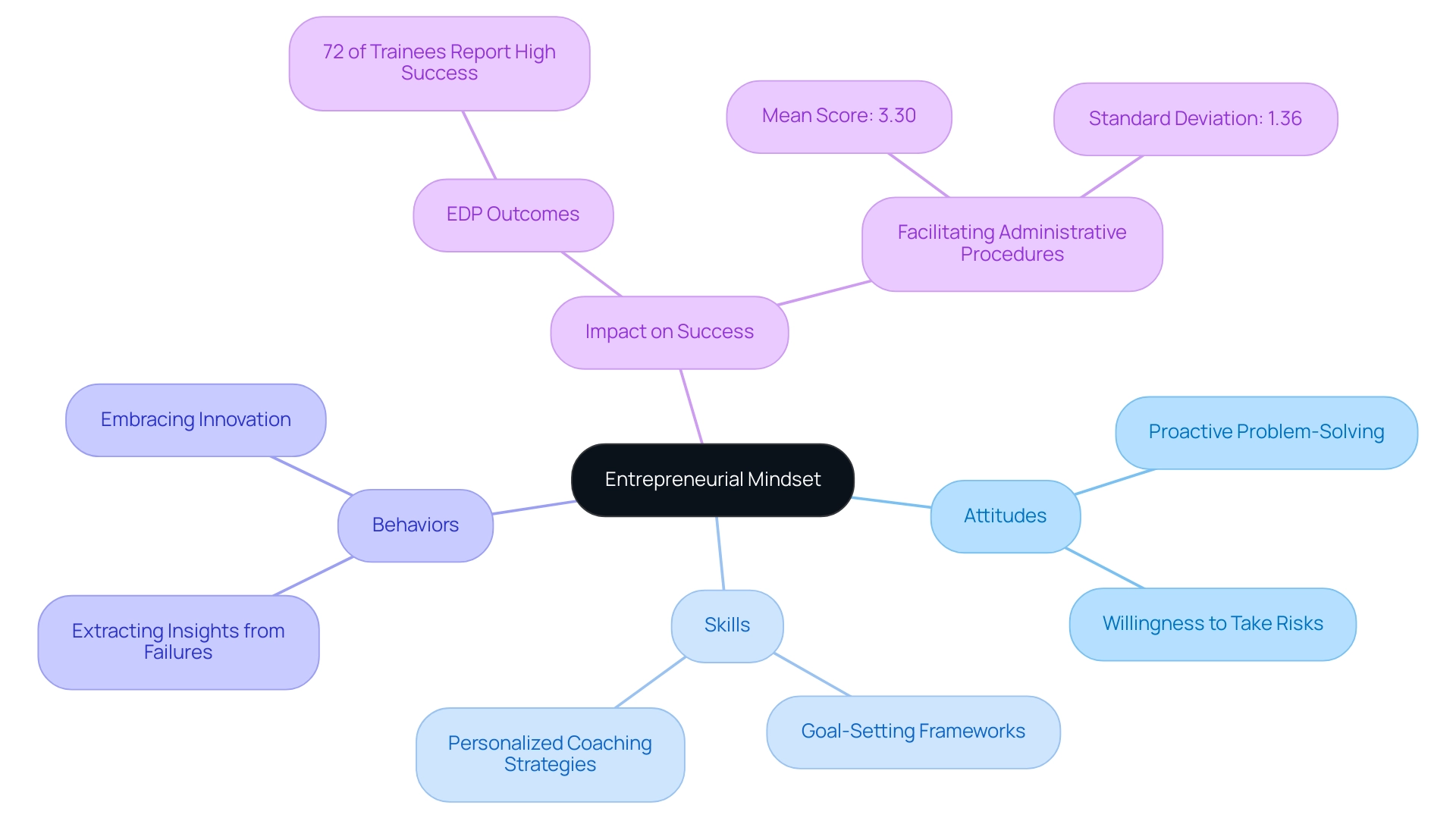
Essential Characteristics of an Entrepreneurial Mindset
A guide to Developing an entrepreneurial mindset is crucial for anyone looking to start the path of business ownership, particularly in today’s changing economy. To enhance your business potential, focus on developing the following key characteristics:
- Creativity: This trait involves the ability to think outside the box and generate innovative ideas. Entrepreneurs often find unique solutions to problems, setting them apart in a competitive landscape.
- Resilience: The capacity to bounce back from setbacks is crucial. Research shows that resilience plays a significant role in entrepreneurial success, enabling individuals to maintain their motivation and adapt to challenges.
- Risk-Taking: Successful business owners are willing to take calculated risks in pursuit of opportunities. According to expert insights, understanding how to measure potential rewards against risks is vital for making informed decisions.
- Adaptability: In the ever-changing corporate environment, the ability to adjust to new circumstances and embrace challenges is paramount. Entrepreneurs who can pivot when necessary are more likely to thrive.
- Vision: Setting clear goals and envisioning the future is a defining characteristic of successful entrepreneurs. This forward-thinking approach allows them to navigate their business strategies effectively.
Moreover, it’s important to recognize the role of your existing skills and community support during this transition. As you develop these business traits, consider how your transferable skills can empower you to mitigate risks and fast-track your new career. Statistics indicate that approximately 15 million Americans are business owners, with projections suggesting that by the end of 2020, 27 million will transition from full-time jobs to self-employment. Moreover, aspiring founders should be aware of financial factors, as the typical startup funding is approximately $10,000, which is essential for strategizing and implementing their ideas. Additionally, community backing can greatly impact entrepreneurial achievements. Engaging with local networks, mentorship programs, and peer groups can provide valuable resources and encouragement, fostering a sense of belonging and shared purpose among entrepreneurs.
Additionally, a quote from Camino Financial states, ‘How to Calculate Your Salary as a Business Owner,’ which highlights the importance of understanding financial implications in business ownership. The case study titled ‘The Role of Experience in Entrepreneurial Achievement’ notes that previous career experience in a specific industry can lead to greater accomplishments for business owners, underscoring how resilience and adaptability are influenced by industry knowledge. By concentrating on creativity, resilience, risk-taking, adaptability, and vision, along with utilizing community engagement, aspiring entrepreneurs can refer to the guide to Developing an entrepreneurial mindset to significantly improve their potential for achievement while navigating the challenges of a changing career landscape.
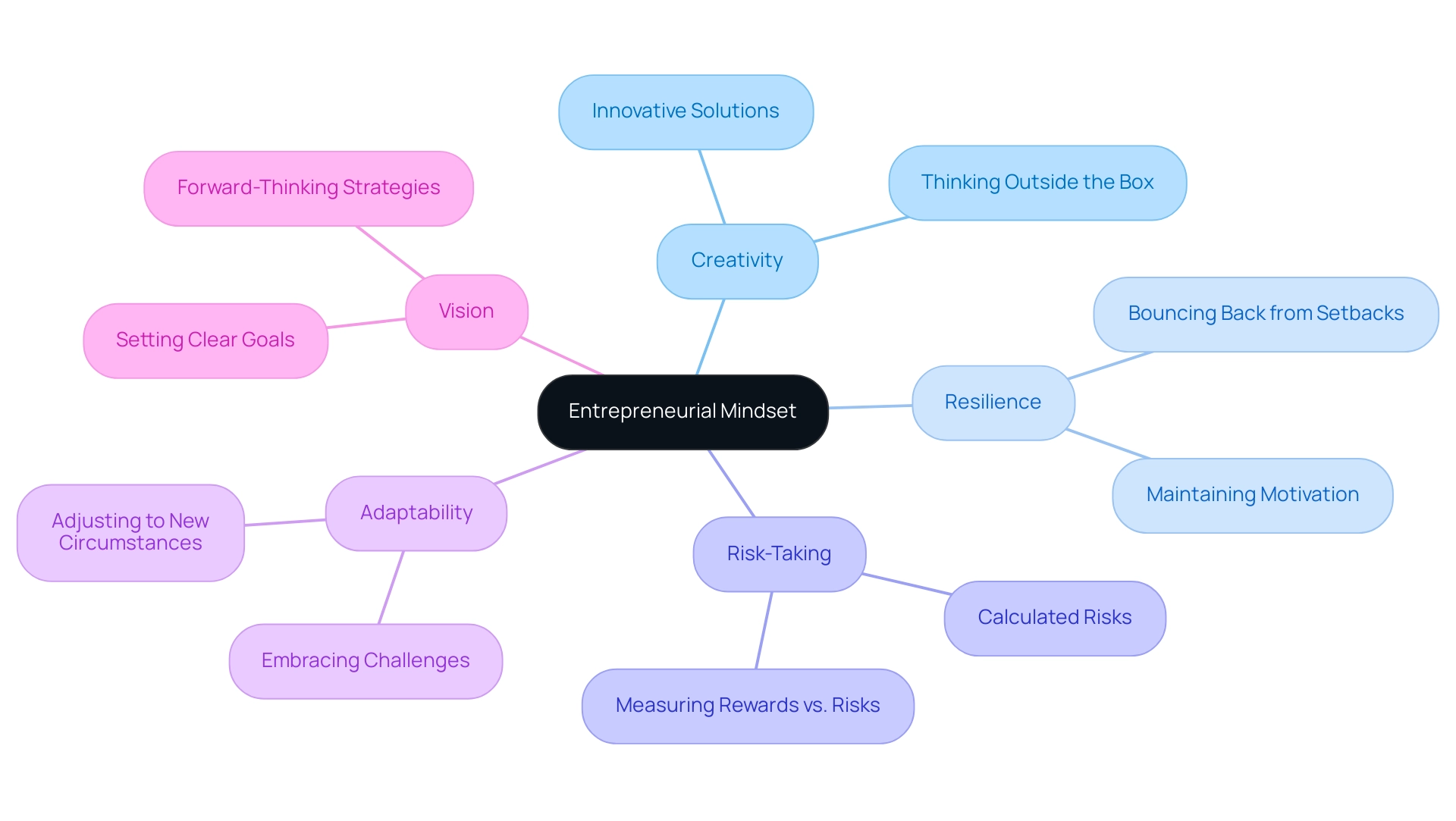
Practical Strategies to Cultivate an Entrepreneurial Mindset
Cultivating an entrepreneurial mindset is crucial for success, and here are several practical strategies to help guide you on this journey:
- Set Clear Goals: It is vital to define both your short-term and long-term objectives. Breaking down these goals into manageable steps creates a roadmap that not only keeps you focused but also increases your chances of success. Consider how 63% of entrepreneurs prioritize quality of life over money when setting these goals. Aligning your ambitions with your personal values can lead to a more fulfilling business journey.
- Seek Feedback: Regularly soliciting feedback from peers, mentors, and industry professionals can provide invaluable insights that enhance your ideas. Engaging in constructive criticism fosters a culture of improvement and innovation, essential elements in entrepreneurship. As Janna, our content director, states, “Incorporating feedback into your process can lead to significant advancements in your projects,” highlighting the importance of continuous learning in entrepreneurial success.
- Engage in Networking: Establishing connections with other business owners and industry professionals enables the sharing of knowledge and experiences. Networking is not just about making contacts; it’s about cultivating relationships that can lead to collaboration and support. In fact, 74% of small businesses cite networking as a crucial factor in overcoming challenges, particularly in navigating healthcare costs. By sharing resources and strategies, entrepreneurs can collectively address these financial barriers more effectively.
- Practice Problem-Solving: Challenge yourself with real-world problems relevant to your field and brainstorm potential solutions. This practice enhances your critical thinking skills and prepares you for the unpredictable nature of entrepreneurship.
- Reflect on Experiences: After completing a project or overcoming a challenge, dedicate time to reflect on the process. Assess what strategies worked, what didn’t, and how you can refine your approach moving forward. This reflection is vital for continuous improvement and will strengthen your business mindset.
Applying these strategies will not only boost your business skills but also act as a guide to developing an entrepreneurial mindset, positioning you for greater success in the ever-evolving landscape of entrepreneurship.
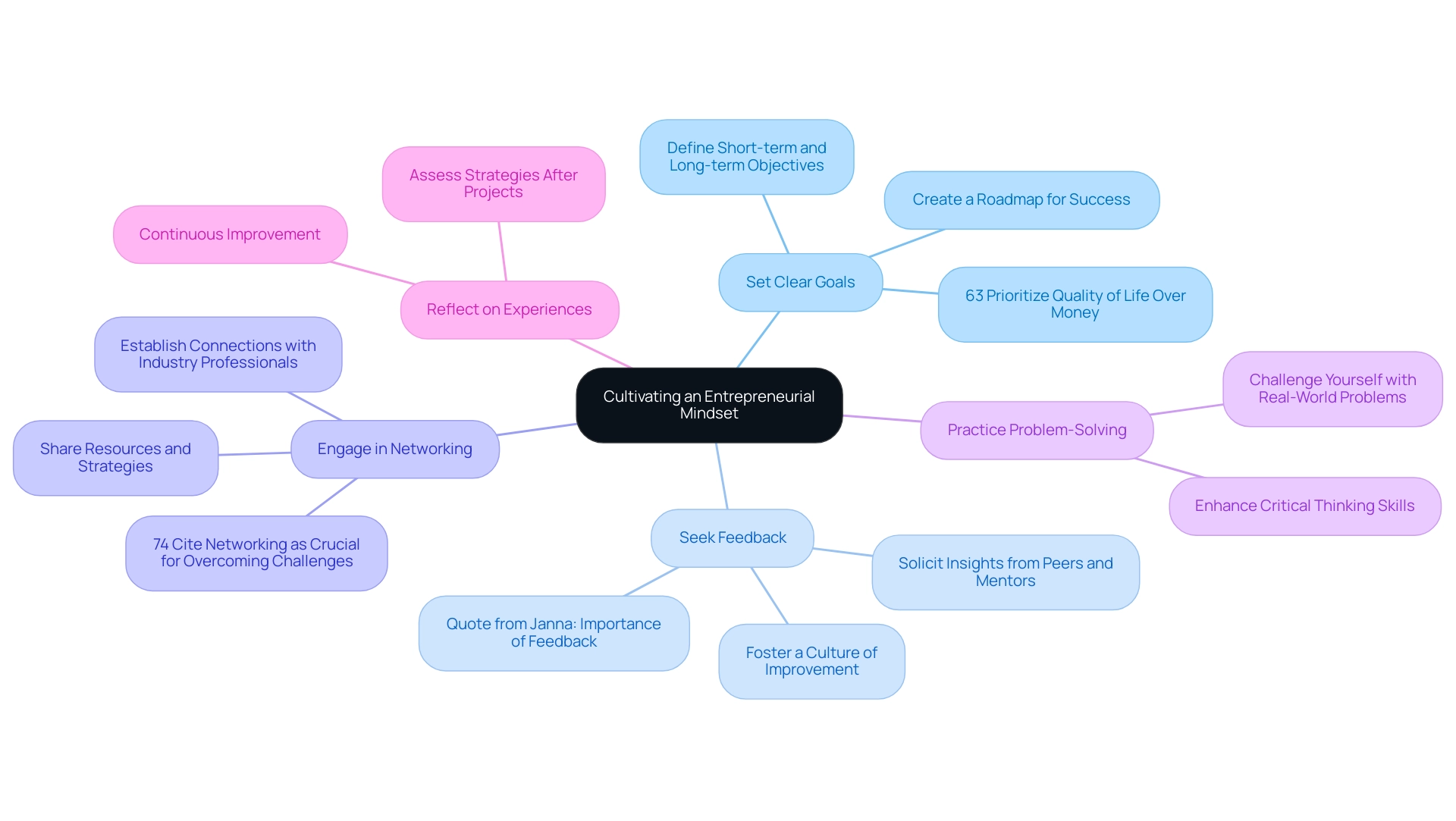
Embracing Failure and Challenges as Growth Opportunities
Embracing failure and challenges is essential for developing an entrepreneurial mindset, especially in today’s changing economy. Instead of viewing setbacks as insurmountable barriers, successful business people see them as valuable chances for learning and development. This perspective is especially pertinent, as current trends show that around 35% of entrepreneurs and small enterprise owners are in the 50-59 age bracket, indicating a wealth of experience that can be leveraged through reframing setbacks.
It’s also noteworthy that around 50% of businesses in the US are home-based, which highlights the importance of this mindset for those considering such ventures. To foster this empowering mindset, consider the following strategies:
-
Reframe Your Mindset: Shift your perception of failure, viewing it as a stepping stone towards success rather than a dead-end.
-
Analyze Failures: After experiencing a setback, take the time to dissect what went wrong and extract meaningful lessons. This analytical approach is crucial, as statistics reveal that a significant number of startups fail within their first year due to insufficient market research and ineffective marketing strategies.
In fact, 20% of entrepreneurs who fail have invested in social media, PR, or advertising, underscoring the importance of understanding market dynamics.
-
Celebrate Small Wins: Acknowledge and celebrate progress, regardless of how minor, to bolster your confidence and motivation.
-
Stay Persistent: Uphold your commitment to your goals, even amid challenges, as persistence is key to overcoming obstacles. Timothy Carter aptly noted,
If we assume a 20 percent failure possibility for our business in year 1, we should be distributing our investments and our time accordingly; we need to balance our risk profile to protect us in the event of failure.
By following the guide to developing an entrepreneurial mindset, you can transform failures into invaluable experiences that significantly contribute to your business journey. Additionally, consider downloading resources like the Veteran Entrepreneur® Program presentation to gain insights into employability challenges and transferable skills that can aid your transition to entrepreneurship, empowering you towards financial independence and community engagement.
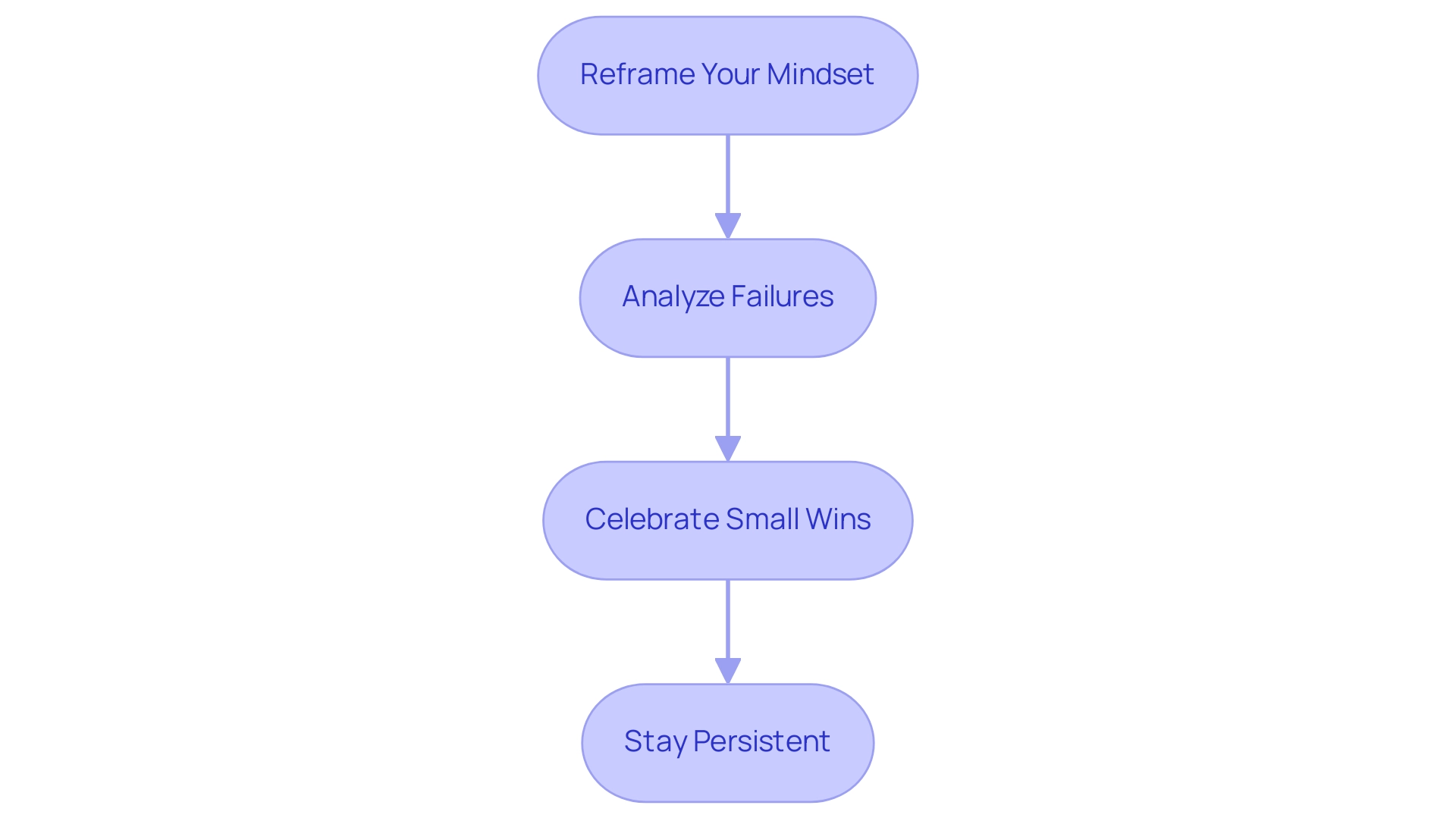
The Importance of Lifelong Learning and Adaptation in Entrepreneurship
In the dynamic realm of entrepreneurship, the guide to Developing an entrepreneurial mindset shows that the commitment to lifelong learning is not merely beneficial; it is essential for sustained success. Entrepreneurs who actively seek new knowledge, skills, and experiences position themselves to remain relevant and competitive, especially in a challenging economic climate where companies like Citigroup aim to cut 20,000 jobs by 2026. A prime opportunity to enhance your entrepreneurial journey is the upcoming International Business Ownership Expo, taking place in New York City from May 30th to June 1st, 2024.
This premier franchise event links business owners with over 300 exhibiting franchise brands and industry experts, offering invaluable resources to jumpstart your business ownership aspirations. Participants can join a range of educational seminars aimed at providing essential skills and insights for success, while also taking part in networking opportunities that promote connections with industry leaders and peers. Here are several effective strategies to incorporate lifelong learning into your business journey:
- Attend Workshops and Seminars: Engaging in professional development opportunities allows you to acquire new skills while simultaneously expanding your network. These gatherings can serve as a platform to connect with other aspiring business leaders and industry experts. In fact, networking is recognized as crucial for business achievement; attending conferences can assist in developing a strong network.
- Read Widely: Delve into books, articles, and online resources that pertain to entrepreneurship and your specific industry. This habit not only broadens your knowledge base but also keeps you informed about the latest trends and best practices.
- Join Professional Organizations: Becoming a member of relevant organizations can provide invaluable resources, networking opportunities, and access to learning experiences tailored for your growth.
- Seek Mentorship: Establish connections with experienced business owners who can offer guidance, share their experiences, and help you navigate the complexities of running a business. The insights gained from mentorship can be transformative. Plus, they get a 46% jump in how often they can promote people from inside, underscoring the value of professional development.
- Stay Curious: Embrace a mindset of curiosity by consistently asking questions and seeking to deepen your understanding of various aspects of entrepreneurship. This curiosity fuels innovation and adaptability.
By committing to lifelong learning and ongoing adaptation, particularly through events such as the International Business Ownership Expo, you not only improve your skill set but also follow a guide to developing an entrepreneurial mindset that opens doors to remarkable opportunities and achievements in your business endeavors. As evidenced by the case study titled ‘Networking: Your Golden Ticket to Success,’ building a robust network through conferences, industry groups, and collaborations can uncover new opportunities and propel entrepreneurs toward remarkable accomplishments. Don’t miss out on this chance to transform your entrepreneurial journey—register today for the International Business Ownership Expo and take the first step towards your future success!
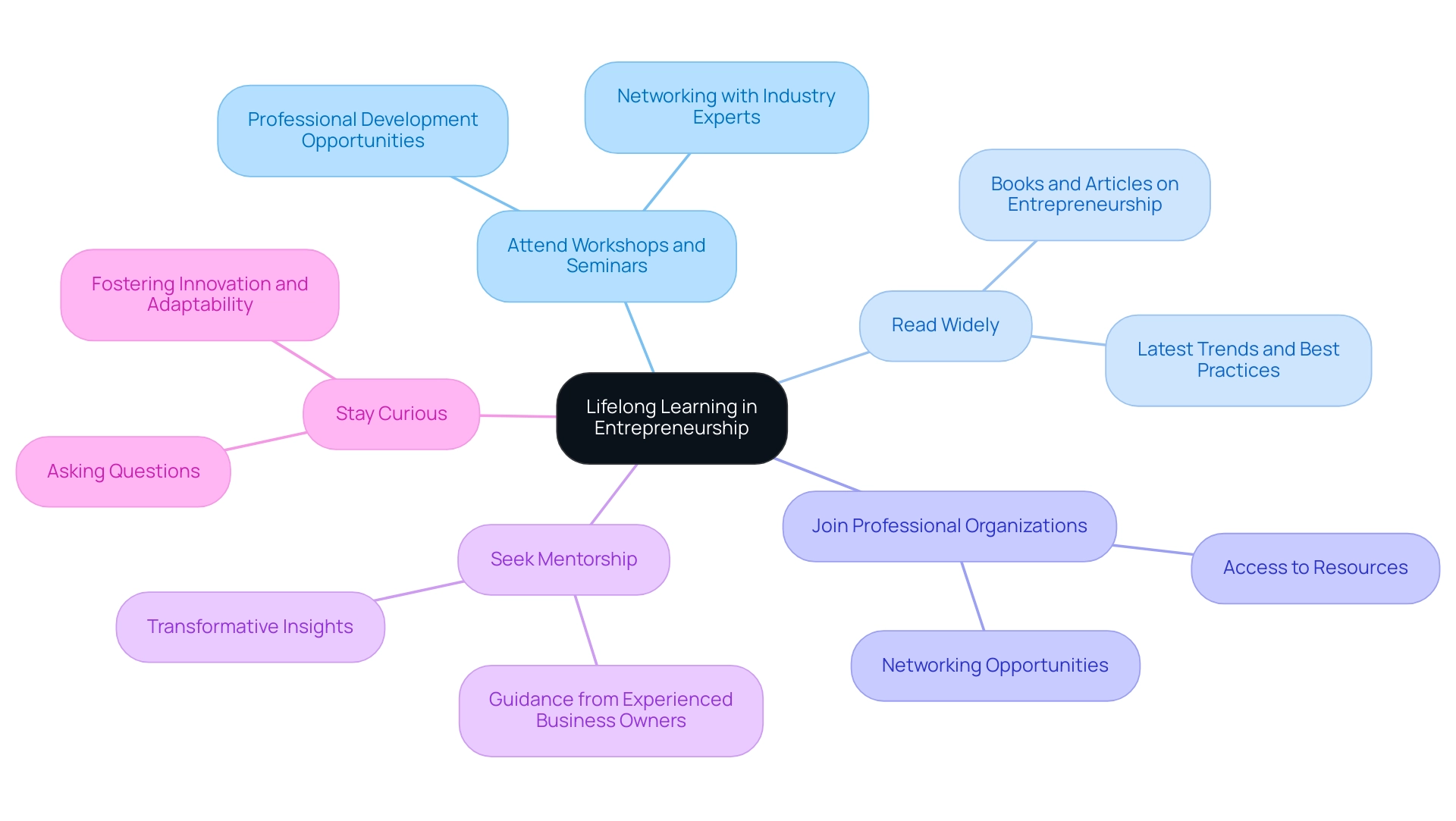
Conclusion
Cultivating an entrepreneurial mindset is a critical step for anyone navigating the transition to business ownership. By understanding the key concepts, characteristics, and practical strategies associated with this mindset, individuals can empower themselves to face the challenges of entrepreneurship with confidence. Core traits such as creativity, resilience, adaptability, and a willingness to take calculated risks are essential for thriving in today’s dynamic business landscape.
Moreover, embracing failure as a learning opportunity is pivotal for growth. Rather than viewing setbacks as obstacles, successful entrepreneurs recognize them as invaluable experiences that contribute to their journey. This perspective, coupled with a commitment to lifelong learning, enables individuals to remain relevant and competitive, adapting to the ever-changing market demands.
Incorporating actionable strategies such as:
- Setting clear goals
- Seeking feedback
- Engaging in networking
can significantly enhance one’s entrepreneurial skills. By fostering a supportive community and continuously refining their approach, aspiring entrepreneurs can navigate their career transitions more effectively. Ultimately, the journey toward entrepreneurship is not merely about achieving success; it is about finding fulfillment and purpose in the pursuit of innovative ideas and solutions. Embracing this mindset will undoubtedly pave the way for a rewarding and impactful entrepreneurial journey.


